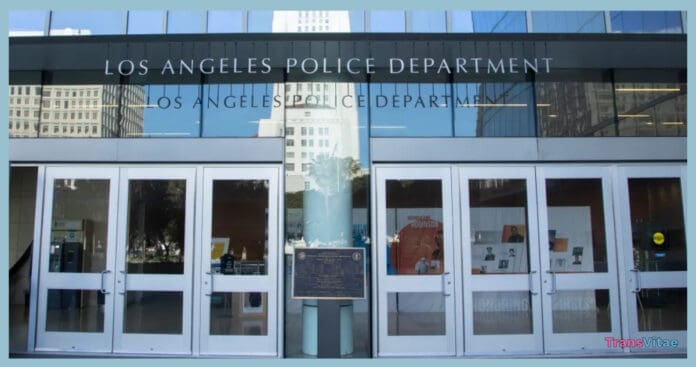Trigger Warning: This article contains discussions of police violence, transphobia, sex work, homelessness, and fatal shootings, which may be distressing to some readers. It details the tragic death of Linda Becerra Moran, a transgender woman who was shot by LAPD after calling 911 for help. If you are sensitive to these topics, please proceed with caution or seek support from trusted resources.
The tragic death of Linda Becerra Moran, a 30-year-old transgender woman from Ecuador, has left the transgender community, sex workers’ rights advocates, and supporters of unhoused individuals grieving and outraged. Moran died on February 27, nearly three weeks after being shot by a Los Angeles Police Department (LAPD) officer in a harrowing incident that has raised serious concerns about police response to vulnerable populations.
A Cry for Help Turns Deadly
On February 7, Moran called 911 from a motel in the Pacoima neighborhood of Los Angeles, desperately pleading for help. In a distressing call to emergency dispatchers, she claimed that she was being held against her will by a man in another room who was bringing other men into her space. Her voice, filled with fear and desperation, conveyed the gravity of her situation.
When LAPD officers arrived at the scene, Moran detailed that she had been struck over the head with a bottle. Body camera footage from the officers shows them checking her for visible injuries. However, the situation escalated when a supervisor arrived, at which point Moran, growing increasingly distressed, asked the officers to leave. “I don’t want your help,” she stated in the video.
Shortly after, Moran picked up a knife and held it to her own throat. The officers, responding with drawn guns, instructed her to drop the weapon. When she moved forward, Officer Jason Sanchez fired his weapon, striking her. She collapsed onto the bed and was rushed to a nearby hospital in critical condition. After weeks on life support, she succumbed to her injuries.
Delayed Response and Community Outrage
In the wake of Moran’s death, the LAPD has faced scrutiny over its handling of the case. For nearly a week after her passing, the department failed to report her death publicly, sparking outrage among advocates and the wider transgender community. Furthermore, questions remain as to whether any action was taken to arrest the man whom Moran accused of holding her captive.
“The entire situation is heartbreaking and disturbing,” said Soma Snakeoil, executive director of the Sidewalk Project, an organization that provides support to unhoused individuals, including sex workers and transgender people. “If a trans woman, a sex worker, or a homeless person is afraid to call the police for help because they might be shot, that is a failure of the system.”
Snakeoil, who had previously met Moran in MacArthur Park while warning unhoused residents about a serial killer targeting their community, described her as a resilient woman who had been fleeing from sexual violence. Moran had experienced homelessness and had engaged in sex work for survival—circumstances that highlight the vulnerabilities many transgender individuals face due to systemic barriers to employment, housing, and safety.
The Complex Realities of Survival
Moran’s tragic death underscores the harsh reality for many transgender individuals, particularly those who engage in sex work due to limited opportunities elsewhere. Discrimination in the workforce, a lack of trans-inclusive shelters, and high rates of violence make survival an uphill battle for many trans women, especially those of color and those with immigration concerns.
Kim Soriano, a researcher with the Sidewalk Project, recalled Moran’s fierce independence. “She was just determined to survive. She was very resilient; she knew what she wanted, and she knew what made her comfortable,” Soriano said.
Moran was also deeply spiritual. She carried a statuette of the Virgin of Guadalupe with her everywhere she went, telling Soriano that it provided her protection through difficult times. “She told me that she carried it all around with her and that it had come a long way with her,” Soriano shared.
A Call for Justice and Change
The investigation into Moran’s death is ongoing. The LAPD’s Police Commission, the department’s inspector general, and the Los Angeles County District Attorney’s Office will review the shooting. However, advocates are concerned that the case will be dismissed as an unfortunate exception rather than prompting systemic change in how law enforcement interacts with marginalized individuals.
Leigh LaChapelle, an associate director at the Coalition to Abolish Slavery and Trafficking, emphasized that law enforcement is often ill-equipped to handle trafficking survivors. “They see them through the lens of criminality rather than vulnerability and treat them as people who need support,” she said. “I’m so worried about this getting written off as a mistake.”
For many, Moran’s death is a painful reminder that transgender individuals—especially those who are unhoused or engaged in survival sex work—are disproportionately subjected to violence, whether at the hands of law enforcement, intimate partners, or strangers. Advocates are calling for an increased investment in community-based crisis response teams that do not rely on police intervention, as well as for greater support for trans-inclusive shelters and economic opportunities that provide transgender women with viable alternatives to dangerous survival strategies.
The Bottom Line
Moran’s death will not be forgotten by those who knew her. Her resilience, faith, and determination to survive in an unforgiving world speak to the struggles faced by so many transgender individuals.
“This isn’t just about one woman’s tragic death,” said Snakeoil. “This is about a system that continuously fails trans women, especially those who are already marginalized. We owe it to Linda and to every trans person living in fear to fight for a future where they don’t have to.”
As the investigation continues, the transgender community and its allies remain committed to seeking justice—not just for Moran, but for all trans individuals who live in a world that too often fails to protect them.


